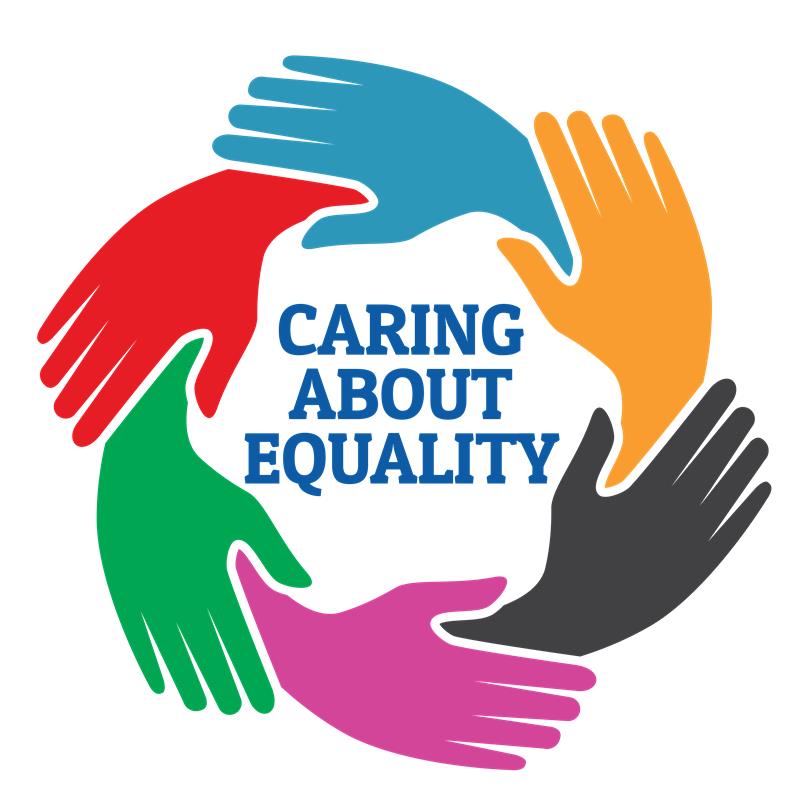
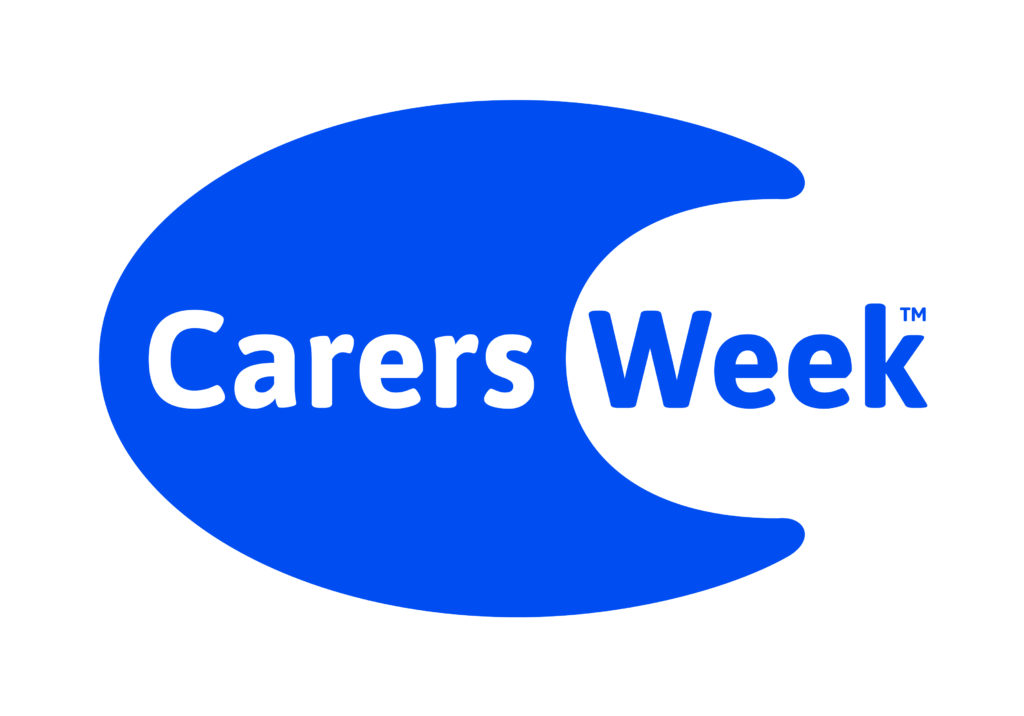
Information Leaflets and Posters

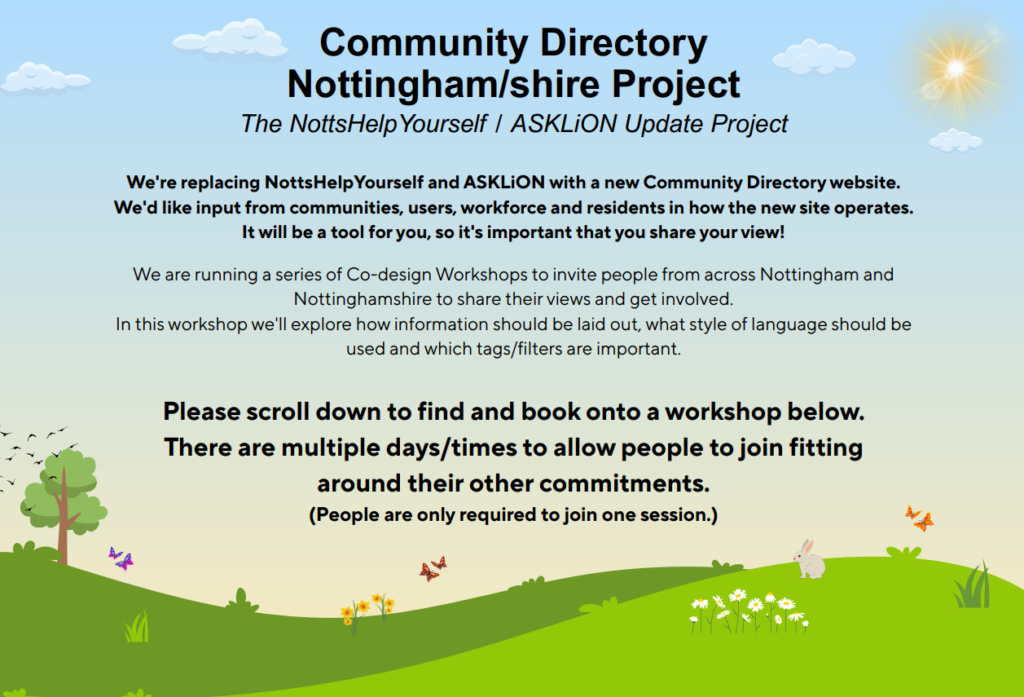
Family Help Workshops – Have Your Say
Nottinghamshire County Council Children & Families Services are running two workshops to gather feedback from families about upcoming changes to how support is delivered. They’re looking for views on how information is shared, how processes can feel clearer, and what language helps families understand what to expect.
Workshop options:
- In-person: Wednesday 26 November, 10:00am–11:30am
Kirkby Central Family Hub, Pavilion Road, NG17 7LL - Online (Teams): Thursday 27 November, 1:30pm–3pm
Anyone interested can email their name and contact details to CFSStrengthsBasedPractice@nottscc.gov.uk, or ask their worker to do this for them.

Mental Health Carers – Co-Design Opportunity
Carers Space Notts is working with Nottinghamshire Healthcare NHS Foundation Trust to improve the information available to carers during a mental health crisis. We’re looking for carers to help shape new resources by sharing their experiences and ideas.
First co-design session:
- Wednesday 3 December (11am–1pm)
- Duncan MacMillan House, Porchester Road, Nottingham NG3 6AA
- Option to join online if preferred
If you’re interested in taking part or can’t attend this session but still want to be involved, please get in touch with Helen Yates at Helen.yates@nottinghamshirecarers.co.uk or text/call 07773 173708.
What’s offered:
- A chance to directly influence new support for mental health carers
- Flexible involvement (in person, online, or contributing another way)
- Travel expenses reimbursed

City Carers Listening Event
Opportunity for carers living in Nottingham city to join a discussion with Chris Atherton, Director of Adult Social Care at Nottingham City Council, to share experiences and views on local social care.
Event details:
- Tuesday 16 December 2025 (11am-12pm)
- Carers Hub, 21-23 Pelham Rd, Nottingham NG5 1AP
If you’d like to attend, please contact Helen Yates at helen.yates@nottinghamshirecarers.co.uk or call/text 07773 173708.
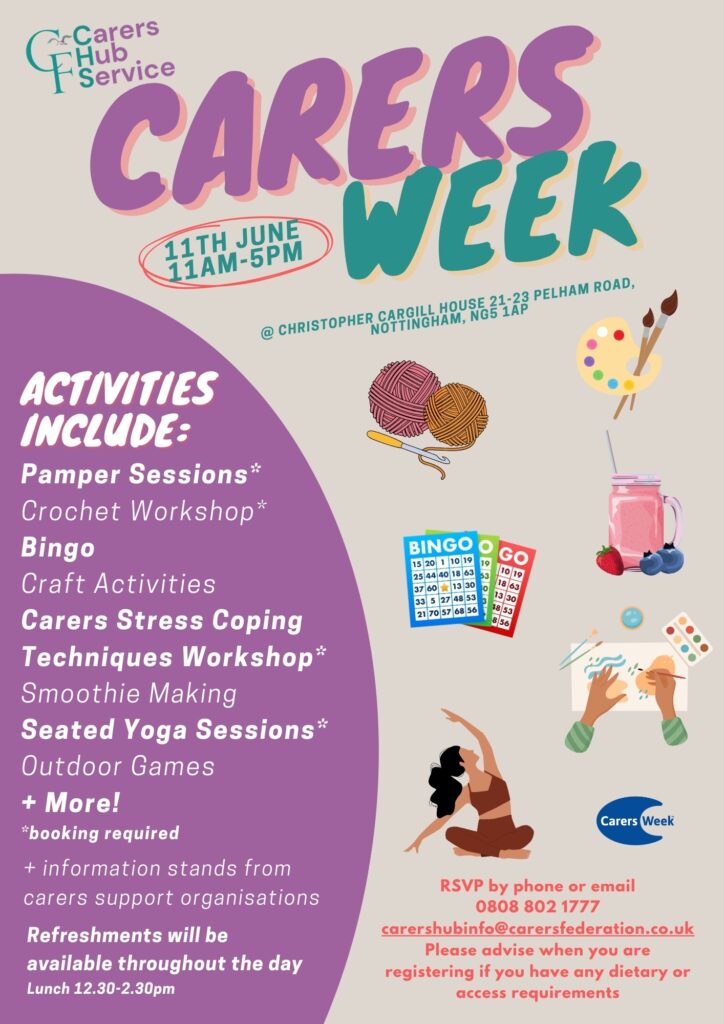
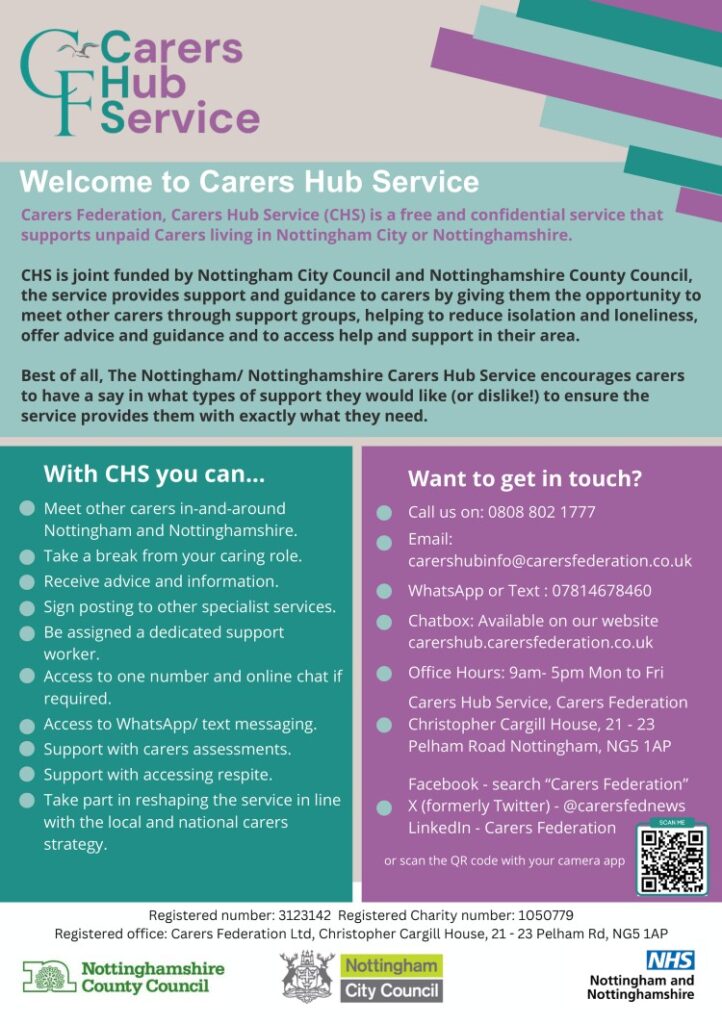
Carers can be identified as:
A person of any age, adult or child who provides unpaid support to a partner, parent, child, sibling, friend, neighbour, who couldn’t manage to live independently or whose health or wellbeing would deteriorate without this help. This could be due to frailty, disability or serious health condition, mental ill health or substance misuse.
Young Adult Carers:
Young adult carers, are young people aged 14-25 who care unpaid for a family member or friend with an illness, disability, mental health condition or an addiction.
Please let our reception team know if you look after someone, or if someone looks after you to ensure that you receive the care you deserve.

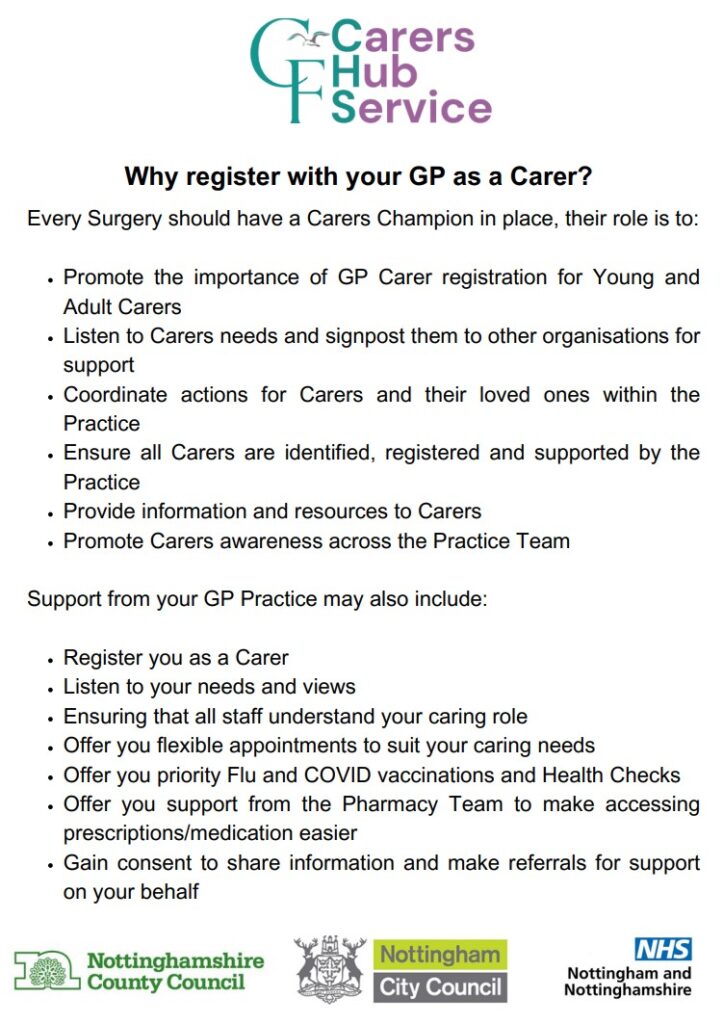

Who are Safe Lives?
Safe Lives is a national charity that has worked for many years to end domestic abuse, and through this work we have gained a lot of experience and knowledge in working with families to make sure that their voices are at the heart of everything that we do. It is for this reason that Safe Lives has been asked to deliver the Family Voices Project.
What is the Family Voices Project?
The Family Voices Project is a piece of work that Safe Lives has been asked to do by national government departments. It is to support early help programmes to develop the best way for families to have a say in how the programmes work. This is so early help programmes can be of most use to the families that use them.
So far, Safe Lives has spoken with practitioners from early help programmes in Nottinghamshire about how they currently work with families to give them a voice in how the services work.
A key part of the project is for us (Safe Lives) to speak with families directly to understand how well you feel your voices are heard in Nottinghamshire and how much difference you feel you are able to make to how early help programmes are run.
What will this project do for Nottinghamshire?
The benefits of working with Safe Lives on this project are:
- To help Nottinghamshire County Council to make sure they always listen to the views and experiences of children, young people and parents/carers/families when they are creating new, and reviewing existing, early help programmes.
- To find out about the ways that the Council is already listening to children’s, young people’s and parents’/carers’ experiences and views when they are setting up new early help programmes or reviewing the ones they are already running.
- To see if these experiences and views make a difference to how early help programmes are set up and reviewed/improved. If so, how?
- To see if and how the sharing of their experiences and views makes a difference to children’s and families’ lived experiences of early help programmes and their daily lives.
- To share with other local authorities and national Government, any examples of where Nottinghamshire County Council is doing a good job of listening to children, young people, parents and carers, and making sure these views and experiences are influencing decisions and improvements to new and existing early help programmes
- To learn from other local authorities who are also doing a good job of this, to help us improve how we do it in Nottinghamshire
- To take the learning from Nottinghamshire to central Government to help create new, and improve existing, early help programmes across England and Wales.
What difference will this project make for families in Nottinghamshire?
By working with Safe Lives on this project we hope that:
- Nottinghamshire County Council and other organisations in the early help system will be better able to listen to the voices of children and families who use early help programmes
- these organisations always listen to your voices to create services that better meet your and other families’ needs
- learning from other local authorities involved in the project will help to improve early help programmes in Nottinghamshire
- the early help programmes in Nottinghamshire will be better able to meet your and other families’ needs.
What else will this work be used for?
As well as looking at practice in local Councils, Safe Lives has been asked to create some national best practice guidance, based on examples of good work in the local areas. This will help the Department for Education to share the good practice with all councils across England and Wales to improve how families can share their voices.
Which programmes are part of the Early Help System?
Early Help Programmes are any service that supports children and families as soon as they need help, to stop a minor problem becoming a crisis. It means families getting the right support and the right time.
Examples of early help and services include parenting support, emotional health and well-being support, and play and activity groups. (“Stepping in as soon as problems arise helps provide safe and happy childhoods. It helps keep families together. And it means children and young people are better prepared as they enter adulthood.” Action for Children [2024]).
Are there any disadvantages or risks to taking part?
The sessions are about your experiences of early help programmes that you have used. We have tried to make sure that the questions we are asking do not upset you, but we understand that talking about your personal experience might be hard for you to do. If you decide that you don’t want to carry on with the discussion, please let Lisa know and we will stop the session.
Will the information I give stay confidential?
We would like to video/audio record the session or phone call so that Lisa can be fully involved in the discussion instead of taking notes. The recordings will not be shared with anyone but the transcribers.
If you change your mind about the sharing your experiences, you can ask us to remove your recording from the project up to 2 weeks after the session and we will arrange for the recording to be deleted.
Everything you say is confidential unless you tell Lisa something that means that you or someone else is at risk of harm. This is a safeguarding worry, and Lisa will need to share that information to keep people safe.
If you tell Lisa information about your experiences with an early help service that Lisa thinks needs to be shared so that the service can improve, then Lisa will discuss this with you first and ask for your agreement to share the information. If you don’t agree then Lisa will not share the information.
When we write the report for this project, we will make sure that everything you have said is made anonymous. If we can’t make something anonymous, we won’t share that piece of information.
Your personal information will be stored safely by Safe Lives for up to 6 months and the deleted. You can ask for a copy of your interview once transcribed if you wish

Alzheimer’s Society Dementia Support
Herbert Protocol Form
More about the Herbert Protocol
Advice for carers of people with dementia at risk of going missing
Herbert Protocol Form
Friendship Group
This group also enables carers/family members to have some regular quality time for themselves knowing loved ones are in a safe place.
Dementia Friendship Group Leaflet
Useful Information
Downloads
- Are you a Carer?
- Carers Hub Newsletter for November 2024
- Carers Hub Flyer 2023 (Printer friendly version)
- Carers Hub Poster 2023
- Carers Hub z-fold leaflet 2023
- Carers Support Groups Flyer 2023
- Carers Hub Referral Form 2024
- RCG Leaflet New 2023
- Carers Booklet Recruitment (CSN)
- Pegasus Card Leaflet
- Relationships Really Matter
- Therapy Tuesday poster
- What Matters to Us
- Arthritis Action
- Feel Good Gold
- NottAlone co production poster
- Recruitment Flyer for NCA Carers Steering Group
- Recruitment Flyer for Carers Space Planning Group
- Support Groups December 2023
- Nottingham Food Support Weekly Rota
- Ashfield Voluntary Action Centre
- January 2024 Support Groups
- Music Care Training Leaflet 2024
- Notts Help Yourself Leaflet
- Carers Emergency Card
Finance and Law
Help claiming benefits, looking after your bank balance and understanding the legal issues of caring.
- Benefits for carers
Directing carers to the benefits that can help them in their caring role - Benefits for the under-65s
Advice and information on helping the person you look after get the benefits that they are entitled to. - Benefits for the over-65s
Advice and information on financial support for older people with a disability or illness. - Carer’s Assement
How your benefits maybe affected after the death of the person you look after and what happens to their benefits - Other benefits
Advice for carers and the people they are looking after on claiming a whole host of other benefits unrelated to their disability or caring
NHS Carers and Caring Information
There is a wealth of information on the NHS website about carers and caring. Below are some links into the site that we hope you will find useful.
- A guide to care and support
Information for carers and people who have care & support needs. - Caring for someone
Advice on providing care, medicines etc. - Care after hospital
Providing care for people who have been recently discharged from hospital. - Taking a break
Caring for someone can be a full-time job – find out about accessing breaks and respite care. - Support and benefits for carers
Caring for someone can be a full-time job – find out about accessing breaks and respite care. - Work and Disability
Guidance, support and help with employment issues. - Being a Young carer
Advice for carers 18 or under and their entitlement to support
Carers Hub Newsletters
Previous Newsletters
2024
March
Hello and welcome to the Carers Federation Carers Hub Newsletter for March 2024
Please find details below of the support groups during March, to express your interest in a support group or to request the Zoom link contact: Tel: 0808 802 1777
Email: carershubinfo@carersfederation.co.uk / Whatsapp or Text: 07814 678460
| Carer Support Groups March 2024 | ||
| District | Date | Time |
| Mansfield Carer Support Group held at Friends Meeting House, 124 Rosemary Street, Mansfield NG18 1RB | Fri 1st March 2024 | 10.00am – 12.00pm |
| Asian Women Carer Support Group held at the Carers Federation Ltd, 21- 23 Pelham Road, Nottingham NG5 AP | Mon 4th March 2024 | 11.00am – 1.00pm |
| Rushcliffe Carer Support Group held at Church of the Holy Rood, Village Street, Edwalton NG12 4AB Guest speaker: Age UK Connect | Tues 5th March 2024 | 1.30pm – 3.30pm |
| Broxtowe Carer Support Group held at Chilwell Community Centre, Inham Road, Chilwell, NG9 4HX | Wed 6th March 2024 | 10.00am – 12.00pm |
| Bulwell Carer Support Group held at Ravensworth Road Methodist Church, Ravensworth Road, Bulwell NG6 8FN | Mon 11th March 2024 | 1.00pm – 3.00pm |
| Ashfield Carer Support Group held at Ashfield Wellbeing Centre, Portland Street, Kirkby in Ashfield NG17 7AE | Mon 11th March 2024 | 1.00pm – 3.00pm |
| Gedling Carer Support Group held at the Gedling Road Methodist Church, Gedling, Nottinghamshire NG4 3EX Guest speaker: Radford Care Group | Tues 12th March 2024 | 10.30am – 12.30pm |
| Worksop Carer Support Group held at The Crossing Church, Newcastle Street, Worksop, Nottinghamshire S80 2AT Guest speaker: Fuel Poverty / Warm Packs | Wed 13th March 2024 | 10.00am – 11.30am |
| Newark Carer Support Group held at Newark Beacon Centre, Gresham Suite, Cafferata Way, Newark, Notts NG24 2TN Guest speaker: Fuel Poverty / Warm Packs | Thurs 14th March 2024 | 10.00am – 12.00pm |
| Bakersfield Carer Support Group held at the Bakersfield & Neighbourhood Community Centre, 312 Sneinton Dale, Nottingham NG3 7DN | Tues 19th March 2024 | 1.00pm – 3.00pm |
| Working Carers Support Group – Via Zoom, book on to receive the link | Tues 19th March 2024 | 7.00pm – 8.00pm |
| Carers Café – Via Zoom, book on to receive the link Guest speaker: Talking Therapies | Thurs 21st March 2024 | 1.30pm – 2.30pm |
| CITY (previously Hyson Green Group) Carer Support Group held at Carers Federation, 21-23 Pelham Road, Carrington, Nottm NG5 1AP Guest speaker: DHA / Safety Online | Mon 25th March 2024 | 11.00am – 1.00pm |
| Retford Carer Support Group held at The Well, Hospital Road, Retford, Nottinghamshire DN22 7BD | Wed 27th March 2024 | 10.00am – 11.30am |
| Parent Carer Support Group via Zoom book on to receive the link | Thurs 28th March 2024 | 7.30pm – 8.30pm |
| Clifton Carer Support Group held at Clifton Community Centre, Southchurch Drive, Clifton NG11 8AR Guest speaker: to be confirmed | Fri 22nd March 2024 Date changed as following week is a bank holiday | 12.00pm – 2.00pm |
Fuel Poverty / Cost of Living Crisis
Are you worried about how the cost-of-living crisis is impacting on you?
Would you like more information and advice on ways to help with the cost of living / fuel poverty?
If the answer is YES please come along to one of Nottinghamshire Carers Hub information sessions, covering:
- Fuel poverty; Nottingham Energy Partnership providing information and support around energy efficiency or heating solutions to people living in fuel poverty
- Cost of living crisis; space to talk about how this could be impacting on you
- Opportunity to pick up a FREE warm pack
- Warm Space with Free Tea / Coffee and Cake
- Opportunity to talk with a Carers Hub Support Worker around your caring responsibilities
- Information about the Carers Hub Service and learn about the benefits of registering as a carer with your GP and using the NHS App
The Fuel Poverty / Cost of Living Sessions will take place on the following dates:
29th February, 7th and 14th March 2024 all 1pm-3pm / At Carers Federation Ltd, 21-23 Pelham Road NG5 1AP
Please book your place by contacting Carers Hub Email: carershubinfo@carersfederation.co.uk or call us on: 0808 802 1777
If you have any difficulties attending a session please let us know
Electric Blanket
Electric blanket fires can be fatal, see attached leaflet for tips on how to stay safe.
Training Opportunities
Free Online Adult Safeguarding Course – contact Carers Hub to access this course:
Tel: 0808 802 1777 / Email: carershubinfo@carersfederation.co.uk
Free Adult IT Training Courses including Digital Skills for ESOL learners:
Delivered by Inspire Learning at Stapleford Library and Beeston Library, for more details visit:
www.inspireculture.org.uk/learning or ring 01623 677 200
Jobskilla – amazing learning opportunities, learn online from home, courses include: Understanding Autism / Dementia Care / Understanding Mental Health / Caring for the Elderly
Counselling Skills / Retail Operations
Get a free android tablet on completion of any course, contact: https://www.jobskilla.co.uk/ or ring 0800 058 4658
Also offering online Business Administration Level Two, click for more details:
Alzheimer’s Society
Build your support network and find out information about dementia in Nottinghamshire. Get information to help you support someone with dementia and look after yourself. Our Information Programmes are for family, friends and carers living with dementia. A friend or relative may have been recently diagnosed or have had dementia for some time.
The sessions are run by skilled, compassionate and experienced staff.
We will be holding these sessions virtually via Zoom. All details will be sent to you in advance of the sessions so you will be able to log in and attend. Please ensure you can attend all sessions.
Our Information Programme runs: 27th February 2024 10:30am-1pm 5th March 2024 10:30am-1pm 12th March 2024 10:30pm-1pm 19th March 2024 10:30am-1pm Please contact your local office before attending. To find out more contact us on: Telephone 0115 934 3811 Email: nottspdss@alzheimers.org.uk
Radford Care Group
Making Sense of Dementia Course in Carlton
This programme of special support sessions for carers of people with dementia will give an improved understanding of all aspects of dementia. The free seven-week programme has experts guiding the group and also offers mutual support from other carers, refreshments and a chance to get your questions answered in a relaxed and informal setting. Help with respite care may be available (subject to suitability).
Booking is required, for more information or to reserve a place please contact us on 0115 9786133 or 07513 856647 or email sue.cain@radfordcaregroup.org.uk
Held at Carlton Hill Surgery, 428 Carlton Hill, Carlton NG4 1JA
Wednesday 10th April to 22nd May 2024, 10.30am – 12.30pm
We Find Any Learner
We are pleased to announce the top six FREE online courses available this month! However, please note that spots are extremely limited, so we urge you not to delay in registering. The demand is high, and places are filling up rapidly.
To be eligible for enrolment, you must be at least 19 years old by August 31st, 2023, reside in England, and not currently be enrolled in an apprenticeship program. This exceptional opportunity allows you to expand your knowledge and skills, whether for personal or professional growth. With a selection of over 50 courses, you can choose the one that best suits your interests and aspirations.
Do not let this chance to unlock your full potential slip away.
Sign up today at www.wefindanylearner.com/book-online/ or call 01226 958 888.
Skilled Hands Organisation – Craft Courses
We now have morning and afternoon craft sessions in Dressmaking, Bag Making, Soap Making, Jewellery Making and Millinery.
Our Morning Sessions starts from 9:15am to 11:45am and our Afternoon Sessions starts from 12:00pm to 2:30pm
These workshops are completely free to Unemployed women, Women with caring responsibilities and those on low income living in Nottingham leading on to starting your own small businesses with the acquired Craft Skills.
For further information, please contact skills.hands.org@gmail.com / 074 32 44 0997
Consultation Opportunity for Mental Health Carers
Nottingham Trent University are sending an invitation to Mental Health Carers to be part of research, gathering opinions and experiences to influence change in policy and procedures.
Tuesday 5th March 2024 / 12.30pm – 5.00pm at Middle Street Resource Centre, Beeston, Nottinghamshire, NG9 2AR. For more details contact Zaral Malani: zara.milani@ntu.ac.uk
Support with Cost of Living
Household Support Fund 4 provides support to vulnerable Nottingham residents in the following ways:
- Free School Meal Vouchers
- Supermarket Vouchers
- Energy Vouchers
- Food Bank Support
- Social Eating Projects Support
- Care Leaver Support
- Mobile Food Supermarket Support
Further information on the support that is available to help with the cost of living can be found on the UK government Website Cost of Living Hub here: https://www.gov.uk/guidance/cost-of-living-payment
If you press ‘Ctrl’ on your keyboard and click the link below at the same time it will take you directly to the Nottingham City Website for more info on this: Household Support Vouchers – Nottingham City Council
Harvest Community Haven
Community Café & Food Bank every Saturday 10am – 12pm at Harvest Community Resource Centre, Queens Road, Beeston NG9 2FF / Tel: 07482 940 898
Support Groups
Peer Support Group promoting wellbeing for 35-55 year olds
Hayley – social prescriber invites you to come and meet new people, share experiences and get advice. Every 3rd Monday of the month, 2pm – 4pm at Admiral Sir John Borlase Warren, 97 Derby Road, Stapleford NG9 7AA.
Carers Council – Allies in Mental Health
Open meetings held at Nottingham Mechanics, North Sherwood Street, NG1 4EZ, 1pm – 4pm, dates for the coming year: 20th March / 15th May / 17th July / 18th September / 20th November / 11th December (Christmas Party). For further details contact Geoff Curtis: 0115 9631 916 / email: geoffcurtis@ymail.com
Muslim Mum’s Pregnancy Group
Nottingham Women’s Muslim Network will be free running monthly, educational and support sessions for pregnant women in Nottingham, which will be run every month on a Thursday at 9.30am by trained professionals and volunteers:
22nd Feb – Postnatal recovery / 21st Mar – Navigating maternity care / 18th Apr – Preparing to breastfeed / 16th May – Pain management / 20th June – Emotional wellbeing
Mary Potter Health Centre, book a place by clicking on the link below:
https://www.eventbrite.co.uk/e/778350877427?aff=oddtdtcreator
Here’s the link to our website for more info: https://supportmecic.com/muslim-village/
Carers in Hucknall Group
Everyone welcome, a warm greeting guaranteed, meeting every 1st and 3rd Tuesday of the month, 1.30pm – 3.30pm at the John Godber Centre, Ogle Street, Hucknall NG15 7FQ, contact Jim Radburn for more information: 0115 9330 746.
Trent Dementia Drop In
For anyone affected by dementia, free refreshments, every 3rd Wednesday of the month, 10.30am – 1.30pm at Cleaves Hall, Castle Gate, Nottingham NG1 7AS
Tel: 0115 7484 220 / Email: contact@trentdementia.org.uk
Please accept our apologies if you are no longer a carer, if you would like us to update your records and remove you from the mailing list please get in touch: carershubinfo@carersfederation.co.uk / 0808 802 1777
January
Hello and welcome to the Carers Federation – Carers Hub Newsletter for January 2024. Season’s Greetings and Best Wishes for the New Year
Please find details below of the support groups during January, some groups aren’t running as usual, see below for details:

Contact details
Tel: 0808 802 1777
Email: carershubinfo@carersfederation.co.uk
WhatsApp or Text: 07814 678460
| Carer Support Groups January 2024 | ||
| District | Date | Time |
| Rushcliffe Carer Support Group – no group as during the festive period | ||
| Bulwell Carer Support Group held at Ravensworth Road Methodist Church, Ravensworth Road, Bulwell NG6 8FN | Mon 8th Jan 2024 | 1.00pm – 3.00pm |
| Ashfield Carer Support Group held at Ashfield Wellbeing Centre, Portland Street, Kirkby in Ashfield NG17 7AE | Mon 8th Jan 2024 | 1.00pm – 3.00pm |
| Asian Women Carer Support Group held at the Carers Federation Ltd, 21- 23 Pelham Road, Nottingham NG5 AP(Note: change of venue & date | Tues 9th Jan 2024 | 12.00pm – 2.00pm |
| Gedling Carer Support Group held at the Gedling Road Methodist Church, Gedling, Nottinghamshire NG4 3EX | Tues 9th Jan 2024 | 10.30am – 12.30pm |
| Broxtowe Carer Support Group held at Chilwell Community Centre, Inham Road, Chilwell, NG9 4HXNote: change of date for January) | Wed 10th Jan 2024 | 10.00am – 12.00pm |
| Worksop Carer Support Group held at The Crossing Church, Newcastle Street, Worksop, Nottinghamshire S80 2AT | Wed 10th Jan 2024 | 10.00am – 11.30pm |
| Newark Carer Support Group held at Newark Beacon Centre, Gresham Suite, Cafferata Way, Newark, Notts NG24 2TN | Thurs 11th Jan 2024 | 10.00am – 12.00pm |
| Mansfield Carer Group held at Friends Meeting House, 124 Rosemary Street, Mansfield NG18 1RB(Note: change of date for January) | Fri 12th Jan 2024 | 10.00am – 12.00pm |
| Bakersfield Carer Support Group held at the Bakersfield Community Centre, 312 Sneinton Dale, Nottingham NG3 7DN | Tues 16th Jan 2024 | 1.00pm – 3.00pm |
| Working Carers Group via Zoom, book on to receive the link | Tues 16th Jan 2024 | 7.00pm – 8.00pm |
| Carers Café – all carers welcomeVia Zoom, book on to receive the link | Thurs 18th Jan 2024 | 1.30pm – 2.30pm |
| Hyson Green Carer Support Group held at Carers Federation, 21-23 Pelham Road, Carrington, Nottingham NG5 1AP(Note: change of venue) Guest speaker: Money Management | Mon 22nd Jan 2024 | 11.00am – 1.00pm |
| Parent Carer Support Group via Zoom book on to receive the link | Thurs 25th Jan 2024 | 7.30pm – 8.30pm |
| Clifton Carer Support Group held at Clifton Community Centre, Southchurch Drive, Clifton NG11 8AR | Fri 26th Jan 2024 | 12.00pm – 2.00pm |
| Retford Carer Support Group held at The Well, Hospital Road, Retford, Nottinghamshire DN22 7BD | Wed 31st Jan 2024 | 10.00am – 11.30am |
Adult Safeguarding Course – we still have spaces available
Carers Hub Service are offering carers the opportunity to complete a free online Adult Safeguarding Course. This can be completed in your own time, if you do not have access to a computer or laptop you can come into the office to complete it.
To book your place contact Carers Hub on 0808 802 1777 or email: carershubinfo@carersfederation.co.uk
Information from Nottingham City Council
Food vouchers and free activities clubs for families this Christmas
We’re continuing to support financially-vulnerable families this Christmas with free activity sessions for youngsters.
We’ve teamed up with the Nottingham Forest and Trent Bridge community trusts to deliver a host of activities across the holidays for pupils who receive free school meals. As well as the fun sessions, the children will also receive a nutritious meal. Funding comes through the Government’s Holiday Activity Scheme, which the council successfully bid for again this year.
Carer of loved one with Dementia / Rushcliffe Borough
Carers in Rushcliffe PCN please use this link – they have developed directories which are specific to Carers, Dementia and other issues in this area only.
Link – https://www.rushcliffehealth.org/directories
Notts Help Yourself have revised their leaflet, see attached. For 24/7 access to information and services in the County visit the website: https://www.nottshelpyourself.org.uk/kb5/nottinghamshire/directory/home.page
AskLion, for 24/7 access to information and services in the City visit the website:
https://www.asklion.co.uk/kb5/nottingham/directory/home.page
Free Training:
We find any learner are offering free training on Counselling Skills / Mental Health First Aid / Understanding Autism, click on the link for more information: www.wefindanylearner.com
Jobs Skilla Academy are offering free training – Level 1 in Retail, eligibility: 19+, UK resident, claiming UC/JSA/ESA or on a low income eg £20,319, click on the link for more information https://www.jobskilla.co.uk/course/remote-level-1-retail-knowledge-non-dev/
Music Training
Opus Music are offering carers Music training, you don’t need music or singing talent, just the interest and openness to find new ways to communicate.
7th February 2023 at Sutton in Ashfield and 9th February at Radford Care Group both 10am – 3pm. The deadline to register is 14th January 2024: contact@opusmusic.org or see the attached poster for the QR code to book on.
Community / Employment / Skills
Our Public Health Team has launched a campaign to raise awareness of gambling harm. The campaign has been carefully developed in collaboration with a co-production group, including residents with lived experience and aims not to attribute blame, be stigmatising or triggering.

Gambling can affect physical and mental health, damage relationships and leave people feeling lonely and isolated. It can also cause problems with employment, education, housing and lead to serious debt.
Gambling-related harm is under-recognised and often hidden. Many people being harmed by gambling do not see themselves as a person with a problem and don’t recognise the issues it’ is causing. When people do recognise they may have a problem, it can hard to talk about it, or to reach out for help because of guilt, shame or worry.
These are some of the signs which may help people recognise if gambling has become harmful to them, or someone they know. These include:
- Being preoccupied, struggling to concentrate or distracted by gambling
- Withdrawing from social activities to gamble instead
- ‘Chasing losses’ to try to win back money already lost
- Lying to others about the time or money spent on gambling
- Experiencing big changes to mood
- Having trouble sleeping
The campaign will highlight the risks and impacts of gambling, help people recognise when they or someone they know is at risk of gambling harm, and where to go to get support.
To learn more about gambling harm, and to find out about free advice and treatment services available in Nottingham, you can visit: www.asklion.co.uk/gamblingsupport
Bassetlaw Carer Support Group
Meet every 2nd Tuesday of the month, 12.30pm – 2.30pm at Worksop Cricket Club, Central Avenue, Worksop, S80 1EN. This is a relaxed, informal group for those who support/care
for someone with a mental health condition. The group offers information, support, social opportunities and a chance to meet others with a similar experience, to share that greater understanding and knowledge of being a carer.
If you require any crisis support during the festive period please contact:
- Nottinghamshire County Council / Adult Social Care: 0300 500 80 80
- Nottingham City Council / Health and Care Point: 0300 131 0300
Please accept our apologies if you are no longer a carer, if you would like us to update our records and remove your details from the mailing list please get in touch: carershubinfo@carersfederation.co.uk / 0800 802 1777
Contact Carers Direct
Telephone
0808 802 0202
Helpline Information
http://www.nhs.uk/carersdirect/carerslives/updates/pages/carersdirecthelpline.aspx
Email
CarersDirect@nhschoices.nhs.uk
Office Hours
Lines are open 8am to 9pm Monday to Friday, 11am to 4pm at weekends. Calls are free from UK landlines.
